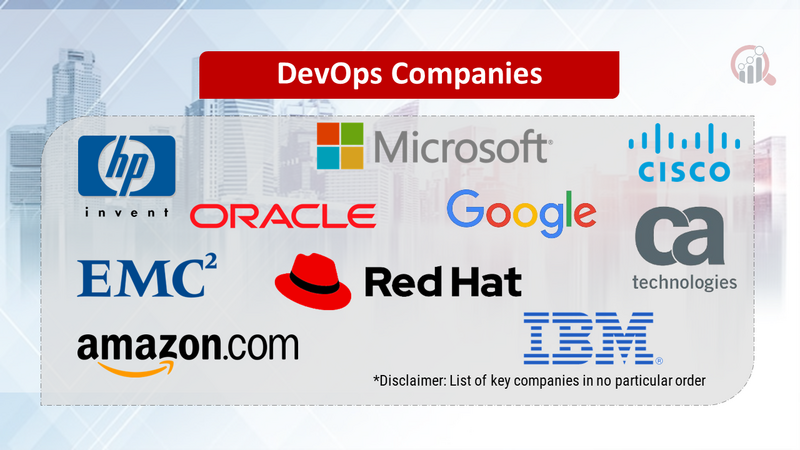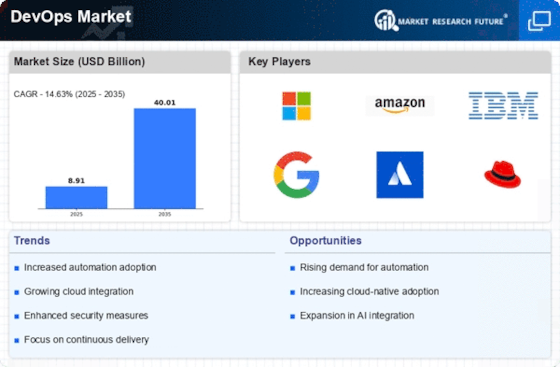Top Industry Leaders in the DevOps Market

The DevOps Market: Competitive Landscape
The DevOps market, once a fringe movement advocating collaboration between development and operations teams, has transformed into a roaring engine driving software innovation and delivery. This thriving landscape boasts a diverse set of players, each vying for a slice of a market projected to reach a staggering CAGR by 2027. Let's delve into the intricate dynamics of this market, examining key players, market share factors, investment trends, and the emergence of exciting newcomers.
Key Players:
- IBM Corporation
- Oracle Corporation
- Amazon Web Services, Inc.
- Hewlett Packard Enterprise Development LP
- Microsoft Corporation
- EMC Corporation
- VersionOne, Inc.
- Red Hat, Inc.
- Google, Inc.
- CA Technologies
- Cisco Systems, Inc.
- Chef, Inc.
- Puppet Labs, Inc.
- Docker, Inc.
- Clarizen, Inc,
- Atlassian
- Micro Focus
- Cigniti
- GitLab
- RapidValue
- TO THE NEW
- XebiaLabs
- CFEngine
- CollabNet
- Electric Cloud
- HashiCorp
- Rackspace
- Perforce
- Clarive
- OpenMake Software
- SonarSource
- TechMagic
- BigPanda
Market Share Analysis Factors:
-
Technology Leadership: Offering advanced automation features, robust CI/CD pipelines, and seamless integration with existing development and infrastructure tools are crucial for market dominance.
-
Platform Versatility: Supporting diverse development methodologies, programming languages, and cloud platforms broadens the addressable market and caters to varying customer needs.
-
Security and Compliance Features: Integrating security best practices and regulatory compliance features within DevOps workflows is becoming increasingly important.
-
Ease of Use and Adoption: Providing user-friendly interfaces, extensive documentation, and community support facilitates wider adoption, especially among smaller teams.
New Entrants and Emerging Trends:
-
AI-powered DevOps: Integrating AI and machine learning (ML) for intelligent automation, anomaly detection, and self-healing infrastructure promises to further streamline and optimize DevOps processes.
-
Security by Design: Embedding security controls and vulnerability assessments directly into DevOps workflows is gaining traction, minimizing security risks throughout the software lifecycle.
-
Serverless Computing: The rise of serverless computing architectures is influencing DevOps tools, with offerings focused on managing and orchestrating serverless functions and microservices.
Current Investment Trends:
-
Venture Capital: VC firms are actively investing in promising DevOps startups, recognizing the market's vast potential and the disruptive potential of innovative solutions.
-
Strategic Acquisitions: Established players are acquiring smaller companies with specialized expertise or strong regional presence to bolster their offerings and expand market reach.
-
Open-Source Collaboration: Open-source DevOps projects foster community-driven innovation and democratize access to powerful tools, driving wider adoption and cost-effectiveness.
The Road Ahead:
The DevOps market is poised for continued explosive growth, driven by the increasing demand for rapid software delivery, shorter release cycles, and improved software quality. Continuous innovation, a focus on automation, security, and AI integration, will be key differentiators for success. New entrants with specialized technologies and disruptive approaches will challenge established players, making the competitive landscape even more dynamic. As investment continues to pour in, the DevOps market promises to become a cornerstone for building, deploying, and managing software in the age of digital transformation.
Latest Company Updates:
-
October 31, 2023: Docker unveils its "State of Containers 2023" report, showcasing the continued rise of container technology as a foundation for modern DevOps practices. -
January 4, 2024: An article in InfoWorld discusses the growing popularity of GitOps, a cloud-native DevOps approach that leverages Git repositories for infrastructure management. -
November 23, 2023: A study by Puppet reveals that security vulnerabilities remain a top concern for DevOps teams, urging organizations to prioritize security throughout the development lifecycle.











